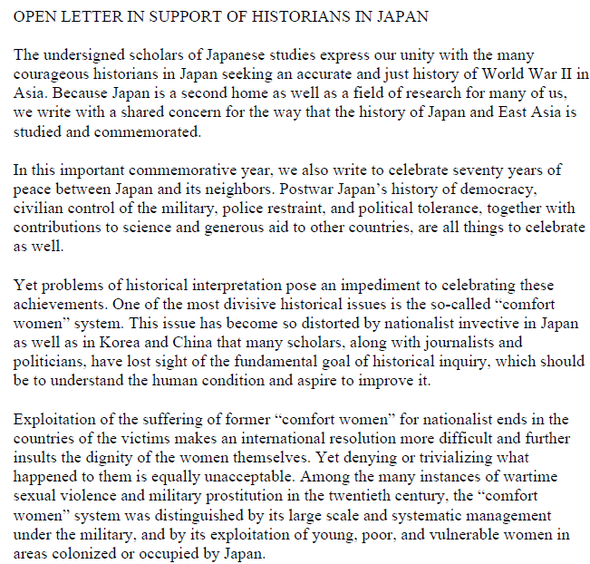hankyoreh
Links to other country sites 다른 나라 사이트 링크
187 prominent historians from ten countries call on Japanese PM to apologize

On May 5, a group of 187 distinguished historians and scholars of Japanese studies from the US and nine other countries urged Japanese Prime Minister Shinzo Abe to treat this year, the 70th anniversary of the end of World War II, as the ideal opportunity to deal with the issues of Japan’s colonial occupation and wars of aggression.
In a letter supporting Japanese historians that was published on Wednesday, these historians expressed their “unity with the many courageous historians in Japan seeking an accurate and just history of World War II in Asia.”
“Postwar Japan’s history of democracy, civilian control of the military [. . .] are all things to celebrate as well. Yet problems of historical interpretation pose an impediment to celebrating these achievements.”
In particular, the scholars criticized Japan for attempting to deny the issue of the comfort women, which they described as “one of the most divisive historical issues,” while at the same time accusing China and South Korea of exploiting the issue politically.
“Exploitation of the suffering of former ‘comfort women’ for nationalist ends in the countries of the victims makes an international resolution more difficult and further insults the dignity of the women themselves. Yet denying or trivializing what happened to them is equally unacceptable,” the scholars said.
“Among the many instances of wartime sexual violence and military prostitution in the twentieth century, the ‘comfort women’ system was distinguished by its large scale and systematic management under the military, and by its exploitation of young, poor, and vulnerable women in areas colonized or occupied by Japan.”
“Much of the archive of the Japanese imperial military was destroyed,” the scholars acknowledged, “[b]ut historians have unearthed numerous documents demonstrating the military’s involvement in the transfer of women and oversight of brothels.”
“Employing legalistic arguments focused on particular terms or isolated documents to challenge the victims’ testimony [. . .] misses the fundamental issue of their brutalization.”
Historical research, the scholars said, must “be free from government manipulation, censorship, and private intimidation. We defend the freedom of historical inquiry, and we call upon all governments to do the same.”
“This year presents an opportunity for the government of Japan to show leadership by addressing Japan’s history of colonial rule and wartime aggression in both words and action. In his April address to the US Congress, Prime Minister Abe spoke of the universal value of human rights, of the importance of human security, and of facing the suffering that Japan caused other countries. We [. . .] urge the Prime Minister to act boldly on all of them.”
The vast majority of the historians who signed this open letter -159 - were from the US. There were also six scholars from Canada, five each from Germany and the UK, four from Australia, three from Japan, two from Austria, and one each from the Netherlands, Switzerland, and Singapore.
The universities represented on the list with the greatest frequency were Harvard University with 11 professors, the University of Chicago with six, Stanford University with five, and Cambridge University with two. A number of well-known professor appeared on the list, including Bruce Cumings, Ezra Vogel, and Herbert Bix, a Pulitzer Prize winner.
By Park Hyun, Washington correspondent
Please direct questions or comments to [english@hani.co.kr]

Editorial・opinion
![[Column] Park Geun-hye déjà vu in Yoon Suk-yeol [Column] Park Geun-hye déjà vu in Yoon Suk-yeol](https://flexible.img.hani.co.kr/flexible/normal/500/300/imgdb/original/2024/0424/651713945113788.jpg) [Column] Park Geun-hye déjà vu in Yoon Suk-yeol
[Column] Park Geun-hye déjà vu in Yoon Suk-yeol![[Editorial] New weight of N. Korea’s nuclear threats makes dialogue all the more urgent [Editorial] New weight of N. Korea’s nuclear threats makes dialogue all the more urgent](https://flexible.img.hani.co.kr/flexible/normal/500/300/imgdb/original/2024/0424/7317139454662664.jpg) [Editorial] New weight of N. Korea’s nuclear threats makes dialogue all the more urgent
[Editorial] New weight of N. Korea’s nuclear threats makes dialogue all the more urgent- [Guest essay] The real reason Korea’s new right wants to dub Rhee a founding father
- [Column] ‘Choson’: Is it time we start referring to N. Korea in its own terms?
- [Editorial] Japan’s rewriting of history with Korea has gone too far
- [Column] The president’s questionable capacity for dialogue
- [Column] Are chaebol firms just pizza pies for families to divvy up as they please?
- [Column] Has Korea, too, crossed the Rubicon on China?
- [Correspondent’s column] In Japan’s alliance with US, echoes of its past alliances with UK
- [Editorial] Does Yoon think the Korean public is wrong?
Most viewed articles
- 1‘We must say no’: Seoul defense chief on Korean, USFK involvement in hypothetical Taiwan crisis
- 2Will NewJeans end up collateral damage in internal feud at K-pop juggernaut Hybe?
- 3[Column] Park Geun-hye déjà vu in Yoon Suk-yeol
- 4Why Korea shouldn’t welcome Japan’s newly beefed up defense cooperation with US
- 5Thursday to mark start of resignations by senior doctors amid standoff with government
- 6N. Korean hackers breached 10 defense contractors in South for months, police say
- 7[Guest essay] The real reason Korea’s new right wants to dub Rhee a founding father
- 8[Column] ‘Choson’: Is it time we start referring to N. Korea in its own terms?
- 9Kim Jong-un expressed ‘satisfaction’ with nuclear counterstrike drill directed at South
- 10[Editorial] New weight of N. Korea’s nuclear threats makes dialogue all the more urgent